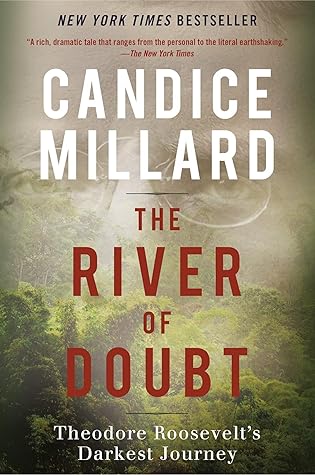More on this book
Community
Kindle Notes & Highlights
Read between
October 18 - November 6, 2021
it was painfully apparent to them all that he had lost the vitality that had awed them at the outset of their overland journey not even three months earlier.
As the men of the expedition looked up at the clear black sky above the River of Doubt, and marveled at the brilliant stars which pointed their way home, they neither knew nor likely even suspected who was actually responsible for their safe passage out of the jungle. In the dark, liana-draped trees that towered on all sides around the tiny wooden shack in which the men fell off to sleep, the warriors of the Cinta Larga—with painted bodies, hard bark belts, and poison-tipped arrows—slipped away as silently and invisibly as they had come. Obeying the timeless calculus of survival in the rain
...more
AFTER RECOVERING from the gravest and most immediate effects of his illness, Roosevelt had been eager to tell the story of his expedition’s journey, but the scale of that achievement was so extraordinary that, to his surprise and outrage, he was met not with praise, but with skepticism and disbelief.
Several American geographers and newspapermen had leapt to his defense, including an editorial in the New York World that growled, “If the Colonel says the river is a thousand miles long, it’s a thousand miles long. We wouldn’t knock off an inch to avoid a war.”
The death of his beloved “Quenikins” devasted Roosevelt. Months after the news had reached him at Sagamore Hill, friends had glimpsed him alone in his barn one day, his arm around his horse’s neck, sobbing.
In October 1918, Roosevelt turned sixty years old. Although sick, frustrated, and brokenhearted over Quentin’s death, he continued to fight, refusing to bow to the sorrow and grief that he had outrun his entire life.
“Never before in my life has it been so hard for me to accept the death of any man as it has been for me to accept the death of Theodore Roosevelt. A pall seems to settle upon the very sky. The world is bleaker and colder for his absence from it. We shall not look upon his like again.”
As the current swept him to his death, Lyra’s last act was to throw his survey notebooks onto the riverbank so that they would be spared for posterity—a tribute to the teachings of Rondon, who had so often asked him to risk his life in the pursuit of a greater cause.
Like Roosevelt, Rondon returned home a hero and remained one for the rest of his life. He was hounded by photographers and journalists, invited to meet the president of Brazil, asked to run for political office (an opportunity he repeatedly declined), and promoted first to brigadier general and then, near the end of his life, to marshal. In the 1920s, after meeting Rondon on a trip to Brazil, Albert Einstein nominated him for the Nobel Peace Prize, and, in 1956, the Brazilian government renamed a territory of ninety-four thousand square miles—nearly twice the size of England—Rondônia in his
...more
During Rondon’s last years, in the 1950s, the path that he had carved out of the wilderness for his short-lived telegraph line became a road now known as BR-364. That road brought cattle ranchers, gold prospectors, rubber-tappers, and adventurers of all grades into the interior, where they took Indian land and wiped out entire tribes.
Roosevelt had been a central figure in each of his children’s lives, but he had been his second son’s inspiration and moral compass. Without him, Kermit was lost. The next day, in a letter to his mother, Kermit confessed, “The bottom has dropped out for me.”
The Cinta Larga’s war against the outside world became a matter of self-preservation, a pitched battle against extinction. This time, the outsiders did not stop coming. They shot Indians on sight, dynamited their villages from the air, and left gifts of poisoned food on their trails. The Indians retaliated by attacking settlements, riddling men with arrows, and mutilating their corpses.
After the exchange was completed in silence, a series of clicks echoed in the jungle as fifty Indian warriors who had stood ready to attack withdrew their arrows from their bows. “In this manner,” the magazine reported, “one of earth’s last Stone Age peoples took their first fearful steps into a bewildering new world of men who know how to fly to the moon.”
“I have always thought it strange,” Cherrie said quietly, “since I had the opportunity to know him and know him intimately—because I feel that I did know him very intimately—how any man could be brought in close personal contact with Colonel Roosevelt without loving the man.”
As he continued, his audience of dignitaries and socialites realized that the man before them—a man whose callused hands had fought off cavalry charges, smuggled guns, and catalogued nature’s most dangerous mysteries—had begun to weep.


